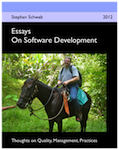Coaching through a translator
Since the beginning of my engagement in China I’ve been working with translators. Most employees of my client do not understand/speak English well or what they can say themselves is very limited. But even, if they only know a few words, they pronounce them in perfect American English. That, of course, doesn’t help much to convey anything meaningful.
So the only way to effectively work with Chinese is to have a translator.
My client knows that and that is why this large corporation, about 140.000 employees and most of them in China, has their own translation service/department.
Wherever I go a translator is booked to be my companion. Translation is a very challenging activity. I’d like to express my sincere gratitude for the help these men and woman provide to me and their coworkers.
However, whereever there is light there is also shadow. Let me show a few examples.
Summary instead of translation
Just as this Spaniard explains (text in Spanish) sometimes translators sum up instead of translate.
It has happened to me with some of the translators I had. The Chinese person talks for several minutes and the translation is then one or two sentences.
That makes it impossible to help someone or find cracks in their train of thought to inject something new to influence them.
Groups start a second conversation in their own language
Another very common occurence when meeting with a group is that they simply start a second conversation amongst themselves in their own language. And sometimes the translator participates in that group conversation. At the very end I get a summary of what was going on or, even worse, what they have decided.
Talk about something else
Sometimes I’ve caught translators to talk about something related to what I said but not really translating my words. For example: I was talking about understanding value creation by using a kanban board. The overall context was ATDD (Acceptance Test-Driven Development). And the translator said “ATDD” in a few sentences while I never used “ATDD” at any point during the whole conversation.
Sometimes one of the Chinese people I’m talking to through the translator does speak English quite well but uses Chinese and the translator so that the others are not left out. It has happened that the Chinese speaker cuts off the translator and starts over in English because the translator was starting to say something completely different. I on the other hand cannot do that, as I don’t speak any Chinese at all.
Used to foreign experts or to business negotiations
I suspect that one of the reasons for the described behavior is that people at my client and the translators are mostly used to working with foreign experts or to participate in business negotiations. That is a completely different situation and some of the described behavior would make perfect sense.
In the case of a foreign expert one would expect the expert to give a statement or a lecture and there isn’t much conversation. That also is in line with the common way teaching works in China. The teacher is basically giving a monologue and the students are expected to listen and not ask any questions. Regardless of what the foreign expert is actually saying the translator can then give a summary of the content of his last few sentences before the next slide is shown.
In a negotiation offers and replies and counter offers are exchanged. Again, a summary or representation what has been said or is written is mostly enough.
Isn’t it about helping a person finding their own way?
Unlike a technical expert I’m not here to tell people how to do a certain job. Instead I’m here to help them find their own solution in a given situation. For that I need to understand them and their situation. I need to convey experiences other people made in similar situation as examples. I tell stories and we talk about what the story means - means to them. Further I need to explore how my coachees think and feel. What makes them strong or weak. What makes them angry, sad, happy. What they don’t care about and what is important to them. And many other things.
That only works through conversation and not through exchange of factual information.
Only a few of the translators have really understood the difference. Those were also the ones who have sat down with me over lunch break to have long conversations about cultural issues and helped me to understand. I actually expressed to my client that some could be coaches themselves.
These have also proven to be very helpful in situations where things started to get out of hand and have taken the liberty to explain to the other people concepts on their own after asking for my permission. And in the end it worked, because we had so many over-coffee conversations that they really could convey my intentions.
It is exhausting
Another thing I noticed is that conversations through a translator can be quite exhausting. One has to constantly hold a thought or remember where the conversation was going while the translator speaks.
On one occasion a translator and a non-translator person with very good English skills did simultaneous translation for me. One was doing the Chinese-English part and the other covered the opposite English-Chinese direction. That allowed the conversation to flow very well. However, it was difficult for me to listen to the English portion of the conversation while blending out the Chinese sound track.
Recommendation
I would recommend to also use the same translator all the time and spend a lot of time talking to the translator about the topic. I’m not talking about a one hour conversation to prepare a meeting. I’m really talking about turning the translator into some sort of assistant coach - in my case. My client actually understood that and they offered to hire someone for that purpose. However, we realized that a bit too late for the current engagement and therefore didn’t start it.
| Previous | 20 Nov 2014 | Next |
This article has been posted to social media sites. There might be comments. Just follow the links:








